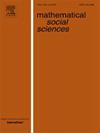择校问题的顶层交易循环机制表征
IF 0.5
4区 经济学
Q4 ECONOMICS
引用次数: 0
摘要
在择校问题中,学校可能会有多个空余名额分配给学生,本文针对这一问题描述了 "顶级交易循环"(TTC)机制。我们首先定义了公平性、一致性和资源单调性的弱化形式。我们证明,TTC 机制是唯一一种满足这些较弱形式的公平性、一致性和资源单调性的帕累托效率机制和策略证明机制。我们还证明,在定义明确的意义上,TTC 是 "最稳定 "的帕累托效率机制。本文章由计算机程序翻译,如有差异,请以英文原文为准。
A characterization of the top trading cycles mechanism for the school choice problem
This paper characterizes the Top Trading Cycles (TTC) mechanism for the school choice problem where schools may have multiple available seats to be assigned to students. We first define weaker forms of fairness, consistency, and resource monotonicity. We show that the TTC mechanism is the unique Pareto efficient and strategy-proof mechanism that satisfies these weaker forms of fairness, consistency and resource monotonicity. We also show that in a well-defined sense TTC is the “most stable” Pareto efficient mechanism.
求助全文
通过发布文献求助,成功后即可免费获取论文全文。
去求助
来源期刊

Mathematical Social Sciences
数学-数学跨学科应用
CiteScore
1.30
自引率
0.00%
发文量
55
审稿时长
59 days
期刊介绍:
The international, interdisciplinary journal Mathematical Social Sciences publishes original research articles, survey papers, short notes and book reviews. The journal emphasizes the unity of mathematical modelling in economics, psychology, political sciences, sociology and other social sciences.
Topics of particular interest include the fundamental aspects of choice, information, and preferences (decision science) and of interaction (game theory and economic theory), the measurement of utility, welfare and inequality, the formal theories of justice and implementation, voting rules, cooperative games, fair division, cost allocation, bargaining, matching, social networks, and evolutionary and other dynamics models.
Papers published by the journal are mathematically rigorous but no bounds, from above or from below, limits their technical level. All mathematical techniques may be used. The articles should be self-contained and readable by social scientists trained in mathematics.
 求助内容:
求助内容: 应助结果提醒方式:
应助结果提醒方式:


